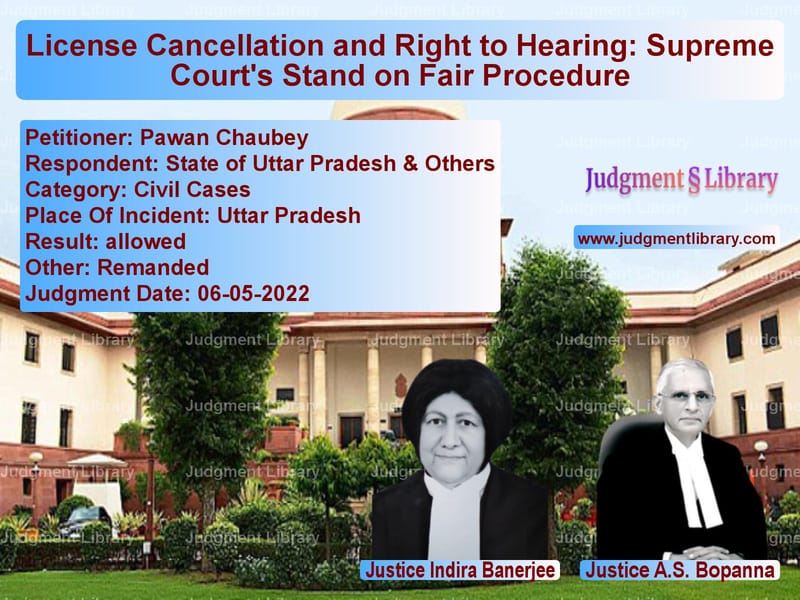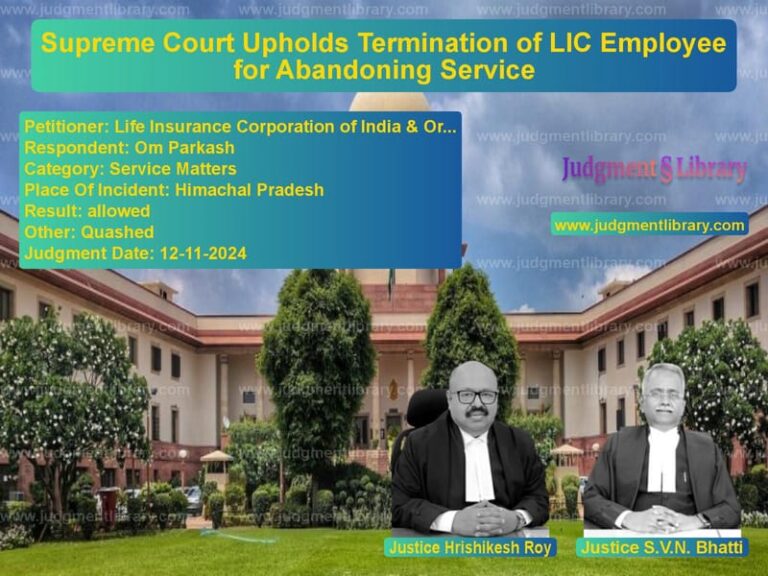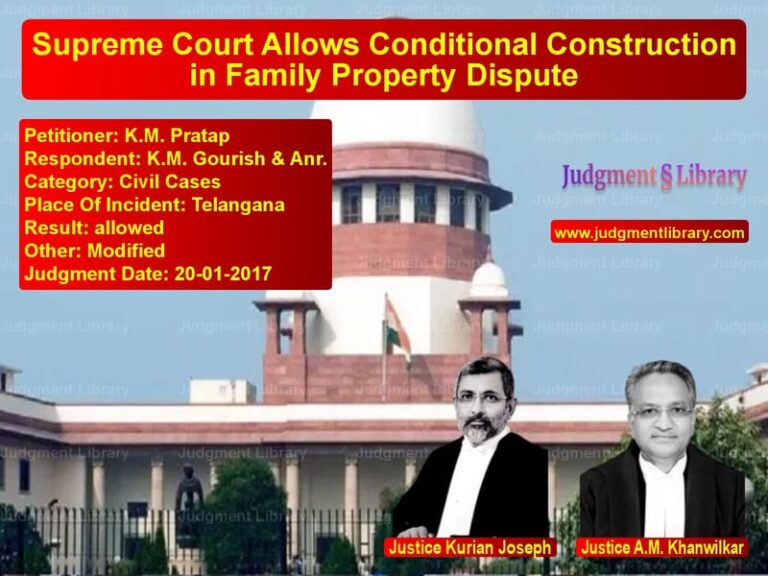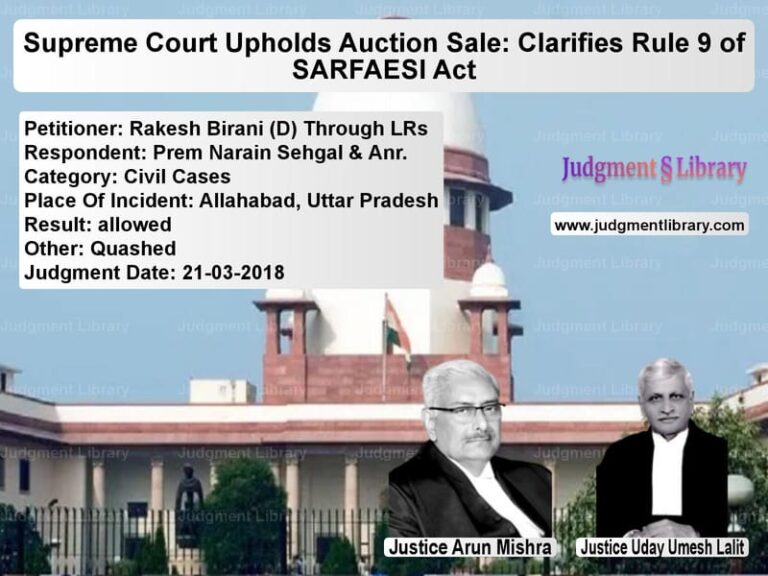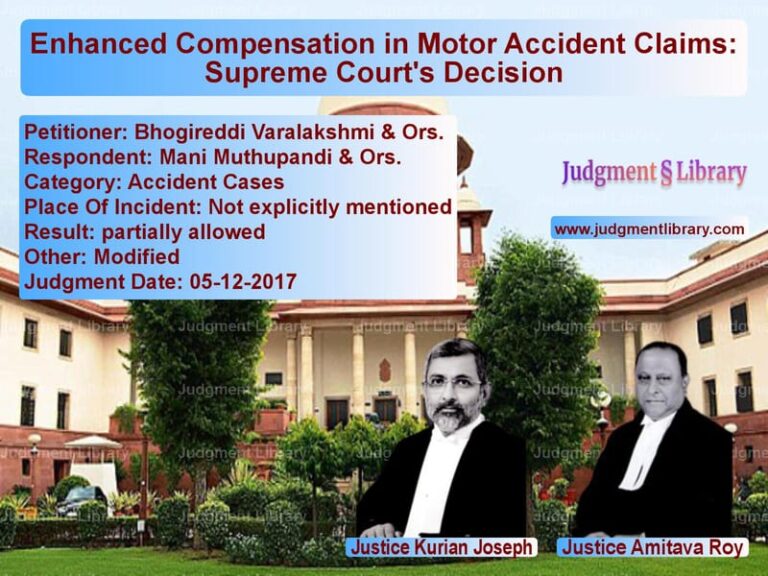License Cancellation and Right to Hearing: Supreme Court’s Stand on Fair Procedure
In a significant ruling, the Supreme Court of India addressed the issue of the cancellation of a fair price shop license and the right to be heard in the case of Pawan Chaubey v. State of Uttar Pradesh & Others. This case sheds light on the importance of procedural fairness and the principle that no adverse decision should be taken without giving the affected party an opportunity to present their case.
Background of the Case
The dispute originated when the license of a fair price shop holder, identified as Respondent No. 4, was canceled by the licensing authority due to previous misconduct. The Respondent challenged this cancellation before the High Court through a writ petition (W.C. No. 27656/2018). The High Court ruled in favor of Respondent No. 4 and quashed the cancellation order.
However, the appellant, Pawan Chaubey, who had been subsequently allotted the fair price shop license, was aggrieved by this decision. He approached the Supreme Court, arguing that he had not been made a party in the High Court proceedings despite having a direct stake in the matter.
Key Issues Before the Court
- Whether the High Court erred in quashing the cancellation order without hearing the appellant.
- Whether a subsequent allottee of a license has the right to be heard before a previous allottee’s cancellation is overturned.
- Whether procedural fairness was followed by the licensing authority and the High Court.
Arguments by the Appellant
The appellant, Pawan Chaubey, contended that:
- He was a rightful subsequent allottee of the fair price shop license.
- His license was directly affected by the High Court’s order, yet he was not made a party to the proceedings.
- Before quashing the cancellation order of Respondent No. 4, the High Court should have ensured that all affected parties, including the appellant, were given a hearing.
Arguments by the Respondents
The respondents, particularly the State of Uttar Pradesh, defended the High Court’s ruling, arguing:
- The initial cancellation of Respondent No. 4’s license was based on past misconduct.
- There was no need to hear the appellant as the matter primarily concerned the legitimacy of the earlier license cancellation.
- The principle established in Poonam v. State of Uttar Pradesh (2016) and Sumitra Devi v. State of Uttar Pradesh (2014) supported their contention that subsequent allottees did not always have an independent legal right to challenge the reinstatement of a previous allottee.
Supreme Court’s Observations
The Bench, comprising Justice Indira Banerjee and Justice A.S. Bopanna, carefully examined the procedural aspects of the case and emphasized the importance of a fair hearing. The Court noted:
- The licensing authority acted solely on the previous misconduct of Respondent No. 4 without considering fresh material evidence.
- The principle of natural justice demands that a person whose rights are being affected must be given an opportunity to be heard.
- High Court proceedings should have included the appellant as a party, as his allotment was directly impacted by the ruling.
Key Judicial Precedents Referred
The Court relied on multiple precedents to reinforce its ruling:
- In Poonam v. State of Uttar Pradesh (2016) 2 SCC 779, the Supreme Court held that subsequent allottees must be heard before any adverse order is passed affecting their rights.
- In Sumitra Devi v. State of Uttar Pradesh, the Court emphasized that natural justice principles apply even when a subsequent allottee’s independent right is not established.
Final Judgment
The Supreme Court allowed the appeal and quashed the High Court’s decision, holding:
- The High Court erred in setting aside the cancellation order without giving the appellant a fair hearing.
- The writ petition must be reconsidered with all affected parties, including the appellant, being given an opportunity to present their case.
- Directed the High Court to dispose of the matter within three months.
Implications of the Judgment
This ruling reinforces the fundamental legal principle that procedural fairness is essential in administrative decisions. It highlights that:
- No decision affecting a person’s rights should be made without giving them an opportunity to be heard.
- Subsequent allottees of licenses or government contracts have a legitimate expectation to be included in legal proceedings that impact them.
- High Courts must exercise caution in ruling on administrative decisions and ensure all affected parties are part of the proceedings.
The judgment serves as a critical precedent for cases involving license cancellations and reinforces the importance of due process in administrative actions.
Petitioner Name: Pawan Chaubey.Respondent Name: State of Uttar Pradesh & Others.Judgment By: Justice Indira Banerjee, Justice A.S. Bopanna.Place Of Incident: Uttar Pradesh.Judgment Date: 06-05-2022.
Don’t miss out on the full details! Download the complete judgment in PDF format below and gain valuable insights instantly!
Download Judgment: pawan-chaubey-vs-state-of-uttar-prade-supreme-court-of-india-judgment-dated-06-05-2022.pdf
See all petitions in Contract Disputes
See all petitions in Consumer Rights
See all petitions in Legal Malpractice
See all petitions in Public Interest Litigation
See all petitions in Other Cases
See all petitions in Judgment by Indira Banerjee
See all petitions in Judgment by A. S. Bopanna
See all petitions in allowed
See all petitions in Remanded
See all petitions in supreme court of India judgments May 2022
See all petitions in 2022 judgments
See all posts in Civil Cases Category
See all allowed petitions in Civil Cases Category
See all Dismissed petitions in Civil Cases Category
See all partially allowed petitions in Civil Cases Category

